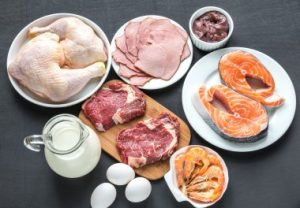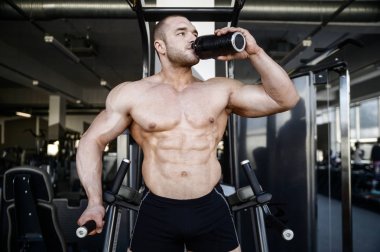
Best Foods To Build Muscle And What To Avoid (8 Important Foods)
Best foods to build muscle and what to avoid are crucial for anyone looking to maximize their strength and physique. Understanding the right nutrition can significantly impact your progress and help you reach your fitness goals more efficiently. Building muscle requires not just rigorous workouts but also a strategic approach to nutrition. The foods you choose can significantly impact your muscle growth, energy levels, and overall performance.
To maximize your gains, focus on consuming nutrient-dense foods rich in protein, healthy fats, and complex carbohydrates, such as lean meats, fish, eggs, nuts, seeds, and whole grains. These foods provide the essential building blocks for muscle repair and growth while fueling your workouts. Conversely, it’s crucial to steer clear of processed foods high in sugars and unhealthy fats, which can lead to inflammation and impede progress. By understanding which foods to embrace and which to avoid, you can optimize your diet to effectively support your muscle-building goals.
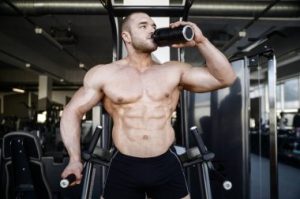
Best Foods To Build Muscle And What To Avoid
To build muscle, focus on consuming lean proteins (like chicken, fish, and beans), whole grains, healthy fats, and plenty of fruits and vegetables. Avoid excessive sugar, refined carbs, and processed foods, which can hinder muscle growth and overall health.
Building Muscle with the Right Foods
To build muscle effectively, focus on consuming lean proteins, complex carbohydrates, healthy fats, and foods rich in vitamins and minerals. Prioritize protein-rich foods like chicken, turkey, lean beef, and fish, which are essential for muscle repair and growth. Complex carbohydrates like brown rice, quinoa, and whole grains provide the necessary energy for intense workouts. Incorporate healthy fats from sources like avocados, nuts, and olive oil to support hormone production and joint health. Avoid processed foods, excessive sugar, and unhealthy fats, which can hinder muscle-building efforts and lead to unwanted weight gain.
High-Protein Foods for Muscle Growth
Protein is the cornerstone of muscle building. Lean meats such as chicken breast, turkey, and lean cuts of beef are rich in amino acids, which are crucial for muscle repair and growth. Fish, particularly salmon and tuna, provide not only protein but also omega-3 fatty acids, which reduce inflammation and promote recovery. Eggs are a versatile and nutrient-dense option, offering high-quality protein and essential vitamins. Plant-based proteins like lentils, chickpeas, and tofu are excellent for vegetarians and vegans, providing muscle-building nutrients without animal products. Whey protein supplements can be a convenient way to increase protein intake post-workout.
The Role of Carbohydrates in Muscle Building
Carbohydrates are vital for providing the energy needed during workout. Complex carbohydrates such as brown rice, quinoa, sweet potatoes, and whole-grain bread should be staples in a muscle-building diet. These foods release energy slowly, keeping blood sugar levels stable and providing sustained energy for intense training sessions. Oatmeal and whole-grain pasta are other great options that can be included in meals to fuel workouts. Avoid simple sugars and refined carbs like white bread and sugary snacks, which can lead to energy crashes and hinder performance.
Healthy Fats and Muscle Gain
Healthy fats are essential for hormone production, including testosterone, which plays a key role in muscle growth. Avocados, nuts, seeds, and olive oil are excellent sources of monounsaturated and polyunsaturated fats. These fats support overall health and provide long-lasting energy. Fatty fish such as salmon and mackerel not only offer protein but also omega-3 fatty acids, which enhance muscle recovery and reduce inflammation. Limit the intake of trans fats and saturated fats found in fried foods and processed snacks, as they can negatively affect heart health and impede muscle-building progress.
Foods and Habits to Avoid
While focusing on muscle-building foods, it’s equally important to avoid those that can undermine your efforts. Processed foods, high in sodium and unhealthy fats, can lead to weight gain and increased body fat. Sugary beverages and snacks contribute to insulin spikes and crashes, affecting energy levels and workout performance. Excessive alcohol consumption can impair muscle recovery and dehydrate the body, slowing progress. Prioritize whole, nutrient-dense foods, and maintain a balanced diet to support muscle growth and overall health.
Best Foods to Build Muscle
Lean Protein Sources
Building muscle requires a balanced diet rich in protein, essential amino acids, and healthy fats. Lean protein sources are crucial for muscle repair and growth. Chicken breast is a staple in muscle-building diets due to its high protein content and low fat, making it ideal for promoting muscle repair and growth. Similarly, turkey provides lean protein and essential amino acids, which are vital for synthesizing new muscle tissue. Eggs are another excellent choice as they contain high-quality protein and are rich in BCAAs (Branched-Chain Amino Acids), which help stimulate muscle protein synthesis and reduce muscle breakdown.
Fish, such as salmon and tuna, are valuable additions to a muscle-building diet. Salmon is rich in omega-3 fatty acids, which help reduce muscle inflammation and promote recovery, and protein, essential for muscle development. Tuna is high in protein and low in fat, making it a convenient option for increasing protein intake without excess calories. Lean beef is also an excellent source of protein and contains creatine, which can enhance strength and muscle mass. Additionally, lean beef is rich in iron and B vitamins, which support energy metabolism and overall muscle function. Including these lean protein sources in your diet can help optimize muscle growth and recovery.
Dairy Products
When aiming to build muscle, incorporating dairy products into your diet can be highly beneficial due to their high protein content and other essential nutrients. Greek yogurt stands out as a top choice because it is rich in protein and contains probiotics, which support healthy digestion and nutrient absorption, crucial for muscle growth. The thick texture of Greek yogurt also makes it versatile for both sweet and savory dishes, adding a nutritional boost to meals and snacks.
Cottage cheese is another excellent option due to its high content of casein protein, a slow-digesting protein that provides a steady release of amino acids into the bloodstream. This sustained release is particularly beneficial for preventing muscle breakdown and promoting recovery, especially when consumed before bedtime. Milk is a classic muscle-building food as it provides a balance of whey and casein proteins, offering both immediate and prolonged protein absorption.
Whey protein helps to quickly stimulate muscle protein synthesis post-workout, while casein continues to provide amino acids over time. Additionally, milk is a good source of calcium and other vitamins and minerals that support overall bone health and muscle function. Including these dairy products as part of a balanced diet can significantly contribute to muscle growth and maintenance, providing both immediate and long-term benefits.
Legumes and Beans
When it comes to building muscle, incorporating legumes and beans into your diet can be particularly beneficial due to their high protein content and rich nutritional profile. Lentils are an excellent choice, as they are not only high in protein but also packed with fiber, which aids digestion and promotes a feeling of fullness. The protein in lentils helps with muscle recovery and supports energy levels, making them an ideal post-workout food.
Chickpeas, another great option, are rich in both protein and carbohydrates, providing a balanced source of energy that sustains workouts and supports muscle growth. The carbohydrates in chickpeas ensure a steady supply of glucose to fuel your muscles during exercise, while their protein content aids in repairing and building muscle tissue.
Black beans, known for being high in protein and fiber, also provide essential amino acids that are crucial for muscle synthesis. These amino acids serve as the building blocks for new muscle tissue and help repair any damage caused by intense workouts. Incorporating these legumes and beans into your diet can not only help enhance muscle growth but also provide a variety of other health benefits, such as improved heart health and better blood sugar control, due to their high fiber content and low glycemic index.
Nuts and Seeds
Nuts and seeds are excellent choices for building muscle due to their nutrient density and versatility. Almonds, for instance, are a great source of protein, healthy fats, and essential vitamins like vitamin E, which acts as an antioxidant to support recovery and reduce inflammation. They also provide a good amount of magnesium, which plays a crucial role in muscle function and energy production.
Chia seeds are another powerhouse, offering a rich source of plant-based protein, omega-3 fatty acids, and fiber. The omega-3s in chia seeds have anti-inflammatory properties that can aid in reducing muscle soreness and promoting recovery. Additionally, the fiber content helps maintain stable blood sugar levels, providing sustained energy for workout.
Pumpkin seeds are high in protein and an excellent source of magnesium, essential for muscle contractions and relaxation. Magnesium also helps in protein synthesis, which is vital for muscle growth and repair. Incorporating these nuts and seeds into your diet can provide the necessary nutrients to support muscle building, improve recovery, and enhance overall health. Whether added to smoothies, sprinkled on salads, or enjoyed as a snack, nuts and seeds are a convenient and effective way to fuel your fitness goals.
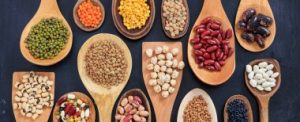
Whole Grains
Building muscle requires a balanced diet rich in nutrients that support muscle growth and recovery. Whole grains are a vital part of this diet, as they provide essential carbohydrates and protein for energy and muscle repair. Quinoa is an excellent choice, as it is a complete protein containing all nine essential amino acids necessary for muscle synthesis. It is also high in fiber and minerals like magnesium and phosphorus, which play crucial roles in energy metabolism and muscle function.
Brown rice is another great option, offering a good source of protein and carbohydrates that provide sustained energy throughout workouts. Its high fiber content also helps regulate digestion and maintain steady blood sugar levels.
Oats are particularly beneficial for muscle building due to their high protein content and complex carbohydrates, which release energy slowly, helping to fuel prolonged physical activity. They also contain important nutrients like iron and zinc, which support oxygen transport and immune function, both critical for recovery and muscle growth. Incorporating these whole grains into a balanced diet can significantly enhance muscle-building efforts while supporting overall health.
Fruits and Vegetables
When it comes to building muscle, incorporating a variety of fruits and vegetables into your diet is essential for optimal performance and recovery. Spinach is particularly beneficial due to its high iron and nitrate content, which supports muscle function and recovery by improving blood flow and oxygen delivery to muscles. Iron is crucial for energy production and endurance, making spinach an excellent addition to a muscle-building diet.
Bananas are another valuable fruit, rich in potassium, which is vital for maintaining proper muscle function and preventing cramps. Potassium also aids in fluid balance and helps replenish electrolytes lost during intense workouts, contributing to better muscle recovery.
Berries, including blueberries, strawberries, and raspberries, are packed with antioxidants, which play a crucial role in reducing inflammation and oxidative stress caused by exercise. These antioxidants help protect muscle cells from damage, promote quicker recovery, and support overall health. By incorporating these nutrient-dense foods into your diet, you can enhance muscle growth, improve recovery times, and maintain optimal muscle function.
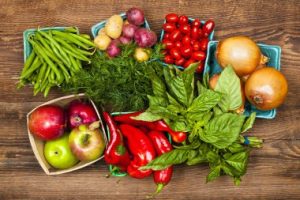
Healthy Fats
In addition to proteins and carbs, healthy fats play a crucial role in muscle building and overall health. Avocados are an excellent source of monounsaturated fats, which support hormone production and contribute to heart health. Olive oil, another source of monounsaturated fats, can reduce inflammation and support recovery after workouts, helping muscles repair more efficiently. Including these healthy fats in your diet can also enhance nutrient absorption and provide the essential fatty acids needed for optimal muscle function. Combining these food sources with plenty of fruits and vegetables ensures a balanced intake of vitamins, minerals, and antioxidants, which are vital for maintaining a strong immune system and promoting efficient recovery.
Supplements (if needed)
In addition to whole foods, certain supplements can enhance muscle-building efforts. Whey protein is a fast-digesting protein that is highly effective in muscle repair and growth, making it an ideal post-workout supplement.
Creatine, a naturally occurring compound found in small amounts in foods like red meat, is popular for increasing strength and muscle mass by enhancing the body’s ability to produce energy rapidly. Branched-chain amino acids (BCAAs), which include leucine, isoleucine, and valine, help aid in muscle recovery and reduce muscle soreness, allowing for more intense and frequent workouts. These supplements, when used in conjunction with a well-rounded diet and regular exercise, can significantly boost muscle-building results. However, it’s crucial to consult with a healthcare provider or nutritionist before adding supplements to ensure they align with individual health needs and goals.
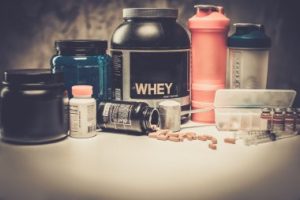
Foods to Avoid for Muscle Building
Highly Processed Foods
When aiming to build muscle, it is crucial to avoid foods that can hinder your progress and negatively impact your health. Highly processed foods are a major culprit, often packed with unhealthy additives, preservatives, and artificial ingredients that offer little nutritional value. These foods can lead to inflammation, reduce recovery efficiency, and potentially interfere with muscle growth. Sugary snacks and beverages are particularly problematic because they are high in empty calories and provide a quick spike in blood sugar followed by a crash, which can affect energy levels and insulin sensitivity.
Instead of contributing to muscle growth, these foods often lead to fat gain, as the body tends to store the excess sugar as fat. Fast food is another category to be cautious about; it typically contains high levels of unhealthy fats and sugars while being low in essential nutrients necessary for muscle repair and growth. Regular consumption of fast food can contribute to an increased risk of obesity and chronic diseases, ultimately hindering your fitness goals. For effective muscle building, it’s best to focus on nutrient-dense foods that provide the necessary vitamins, minerals, and macronutrients to support your training and recovery processes.
Excessive Saturated and Trans Fats
When aiming to build muscle, it’s essential to avoid foods high in saturated and trans fats, as they can hinder progress and negatively affect overall health. Fried foods, for example, are often high in unhealthy fats, which can contribute to inflammation and poor cardiovascular health. Consuming excessive amounts of these fats can lead to an increase in body fat, making it more challenging to achieve a lean, muscular physique.
Certain margarines, in particular, are known to contain trans fats, which not only increase the risk of cardiovascular diseases but can also interfere with the body’s ability to build and repair muscle tissue. These fats can promote the production of inflammatory markers in the body, which can impair recovery and muscle growth. Instead, it’s better to focus on healthier fat sources, such as those from nuts, seeds, avocados, and olive oil, which support muscle growth and overall well-being. Reducing the intake of foods high in saturated and trans fats can lead to better health outcomes and more effective muscle-building efforts.
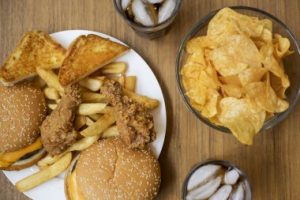
Refined Carbohydrates
When focusing on muscle building, it is crucial to avoid certain foods that can hinder progress. Refined carbohydrates, such as those found in white bread, should be minimized because they are low in nutrients and fiber. They can lead to spikes in blood sugar, causing insulin levels to rise, which may promote fat storage rather than muscle growth. Instead of white bread, opt for whole-grain alternatives that provide more fiber and nutrients.
Pastries and donuts are also best avoided due to their high sugar and unhealthy fat content, offering little nutritional value. These sugary treats can contribute to weight gain and insulin resistance, ultimately impeding muscle development. Opting for nutrient-dense foods that support energy levels and muscle repair is a more effective strategy for muscle building. By choosing whole grains, lean proteins, and healthy fats, you can ensure that your diet is aligned with your fitness goals and conducive to building and maintaining muscle mass.
High-Sugar Foods
When aiming to build muscle, it’s essential to avoid high-sugar foods, as they can undermine your progress. Candy is a prime example, providing empty calories with no nutritional benefits, leading to fat gain and potential energy crashes due to rapid spikes and drops in blood sugar levels.
Similarly, sugary cereals, often marketed as a quick breakfast option, are high in sugar and low in protein, making them poor choices for muscle growth. These cereals can lead to energy fluctuations and don’t provide the sustained energy or nutrients necessary for muscle repair and development. Instead, focus on nutrient-dense foods that offer a balance of protein, healthy fats, and complex carbohydrates to support your muscle-building efforts. Reducing the intake of these high-sugar foods will help maintain stable energy levels, improve body composition, and enhance overall health, creating a better environment for muscle growth.
Excessive Alcohol
When focusing on muscle building, it’s crucial to be mindful of certain foods and beverages that can impede progress. One of the most detrimental is excessive alcohol consumption, particularly beer and spirits. Alcohol is high in empty calories, which means it provides energy without any essential nutrients. This can lead to an increase in body fat, counteracting efforts to gain lean muscle mass.
Moreover, alcohol can negatively impact muscle recovery and protein synthesis, the processes that are vital for muscle growth. It can reduce testosterone levels and increase cortisol, a stress hormone that can lead to muscle breakdown. Alcohol also impairs the body’s ability to absorb important nutrients such as B vitamins, zinc, and magnesium, all of which are crucial for muscle repair and growth. Additionally, it dehydrates the body, affecting performance and delaying recovery. Avoiding excessive alcohol can help optimize muscle-building efforts by ensuring that the body has the nutrients and conditions necessary to effectively repair and build muscle tissue.
Low-Quality Proteins
When aiming to build muscle, it’s important to avoid low-quality proteins and processed meats. These often contain high levels of sodium and preservatives, which can be detrimental to overall health and may negatively impact muscle growth. Low-quality proteins might not provide the essential amino acids necessary for effective muscle repair and growth.
Processed meats, such as sausages and deli meats, are frequently loaded with additives and unhealthy fats, which can undermine your fitness goals. Additionally, certain protein bars, while convenient, may contain high levels of sugar and artificial ingredients that can counteract your efforts. Opting for natural, whole food sources of protein will support better muscle development and overall health.
High-Sodium Foods
When aiming to build muscle, it’s crucial to avoid high-sodium foods, as they can negatively impact your progress. Salty snacks, such as chips, pretzels, and processed foods, are often laden with excess sodium, which can lead to water retention and bloating. This not only affects your physique by making you appear puffier but can also hinder muscle definition and overall health.
Excess sodium intake may lead to elevated blood pressure and negatively impact cardiovascular health, which can interfere with your ability to exercise effectively. For optimal muscle growth and recovery, it’s better to focus on a balanced diet rich in lean proteins, complex carbohydrates, and healthy fats, while minimizing your consumption of salty, processed snacks.
Artificial Sweeteners and Additives
When aiming to build muscle, it’s crucial to avoid foods and beverages that can undermine your progress and overall health. Artificial sweeteners and additives, commonly found in diet sodas, can be particularly detrimental. These substances often contain harmful additives that may interfere with metabolism and appetite regulation, potentially sabotaging your muscle-building efforts.
Additionally, diet sodas, despite being calorie-free, can disrupt metabolic processes and lead to cravings for unhealthy foods. Certain artificial flavorings, prevalent in processed snacks and beverages, also pose risks by negatively impacting overall health. These flavorings can contribute to inflammation and may have long-term adverse effects on your body, detracting from your fitness goals. Therefore, steering clear of these items and opting for whole, nutrient-dense foods is essential for effective muscle building and overall well-being.
Frequently Asked Questions (FAQ) About Best Foods To Build Muscle And What To Avoid
Q1. What are the best foods for building muscle?
A. The best foods for building muscle are those rich in protein and essential nutrients that support muscle growth and repair. These include:
- Lean Meats: Chicken breast, turkey, lean beef, and pork are excellent sources of high-quality protein.
- Fish: Salmon, tuna, and mackerel are rich in protein and omega-3 fatty acids, which reduce inflammation and support muscle recovery.
- Eggs: A complete protein source with essential amino acids and healthy fats.
- Dairy Products: Greek yogurt, cottage cheese, and milk provide protein and calcium.
- Plant-based Proteins: Beans, lentils, tofu, and tempeh offer protein for vegetarians and vegans.
- Nuts and Seeds: Almonds, walnuts, and chia seeds provide healthy fats and protein.
- Whole Grains: Quinoa, brown rice, and oats supply carbohydrates for energy and fiber for digestion.
Q2. Why is protein important for muscle growth?
A. Protein is crucial for muscle growth because it provides the building blocks (amino acids) needed to repair and build new muscle tissues after workouts. Consuming adequate protein helps increase muscle mass, strength, and recovery.
Q3. How much protein should I consume daily to build muscle?
A. The recommended protein intake for building muscle is typically around 1.2 to 2.2 grams of protein per kilogram of body weight per day. This range can vary based on factors such as age, sex, activity level, and fitness goals.
Q4. What are some good sources of plant-based protein for muscle building?
A. Good sources of plant-based protein include:
- Legumes: Lentils, chickpeas, and black beans
- Tofu and Tempeh: Made from soybeans and rich in protein
- Quinoa: A complete protein containing all nine essential amino acids
- Nuts and Seeds: Almonds, peanuts, hemp seeds, and chia seeds
- Plant-based Protein Powders: Pea, rice, or soy protein
Q5. What foods should I avoid when trying to build muscle?
A. Avoid or limit these foods to optimize muscle growth:
- Processed Foods: High in unhealthy fats, sugar, and additives
- Sugary Beverages: Offer empty calories and no nutritional benefits
- Alcohol: Can interfere with protein synthesis and recovery
- Refined Carbs: Such as white bread and pastries that can lead to blood sugar spikes and energy crashes
- Trans Fats: Found in many fried and packaged foods, which can promote inflammation
Q6. Is it necessary to use protein supplements to build muscle?
A. Protein supplements are not necessary but can be a convenient way to meet protein needs, especially if dietary intake is insufficient. Whole foods should be prioritized for their additional nutrients, but supplements like whey or plant-based protein powders can be useful for those with higher protein requirements.
Q7. How important are carbohydrates and fats in a muscle-building diet?
A. Carbohydrates are essential for providing energy during workouts and aiding recovery, while fats support hormone production and overall health. A balanced diet including all three macronutrients—protein, carbohydrates, and fats—is crucial for optimal muscle growth and function.
Q8. Can I build muscle on a vegetarian or vegan diet?
A. Yes, muscle can be built on a vegetarian or vegan diet by consuming a variety of protein-rich plant foods and ensuring sufficient caloric intake. Combining different plant proteins throughout the day can help provide all essential amino acids necessary for muscle growth.
Q9. How can I optimize my diet for muscle recovery after workouts?
A. To optimize recovery:
- Post-Workout Meal: Consume a combination of protein and carbohydrates within 30-60 minutes after exercise to replenish glycogen stores and repair muscles.
- Hydration: Drink plenty of water to support recovery and overall performance.
- Antioxidant-Rich Foods: Berries, leafy greens, and nuts can help reduce inflammation and aid recovery.
Q10. Are there specific vitamins and minerals that support muscle growth?
A. Yes, several vitamins and minerals support muscle growth, including:
- Vitamin D: Supports bone health and muscle function.
- Calcium: Essential for muscle contractions.
- Iron: Supports oxygen delivery to muscles.
- Magnesium: Involved in muscle relaxation and protein synthesis.
- B Vitamins: Aid in energy production and muscle repair.
Conclusion
In conclusion, building muscle effectively requires a diet rich in high-quality protein sources, healthy fats, and complex carbohydrates. Foods such as lean meats, fish, eggs, dairy products, legumes, nuts, seeds, and whole grains provide essential nutrients and amino acids necessary for muscle growth and recovery. It’s also important to incorporate plenty of fruits and vegetables to ensure adequate intake of vitamins, minerals, and antioxidants.
On the other hand, it is advisable to avoid or limit processed foods high in added sugars, unhealthy fats, and refined carbohydrates, as these can contribute to inflammation and hinder muscle-building progress. Additionally, excessive consumption of alcohol and sugary drinks should be avoided, as they can negatively impact metabolism and overall health. By focusing on nutrient-dense, whole foods and minimizing intake of unhealthy options, individuals can optimize their diet to support muscle growth and overall well-being.
